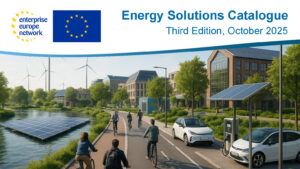TRNL20220406035
A Dutch research institute is looking for digital solutions and business models that can sustain a peer-to-peer energy trading offer.
A Dutch research institute is partner of an international consortium, creating an open innovation platform and network in which large enterprises can set out technical challenges for SMEs and start-ups to propose innovative solutions to. One of these technology challenges digital solutions and business models for P2P energy trading.
P2P trading empowers prosumers and consumers, leading to increased customer engagement / satisfaction, greater grid flexibility, and increased renewables penetration in the energy mix, besides increasing energy savings. The idea of creating an online marketplace where users can directly trade their electricity is highly dependent on technology, as the core of operations are based on online platforms that manage transactions and connect users to each other and the grid operators.
This challenge aims to identify digital solutions and business models in order to assess possible value that can be extracted from the participation in the P2P business.
Solutions are expected to have been demonstrated in the relevant environment (technology readiness level 6) but may need further development to achieve commercial scale and resilience. The winning solution will be field-tested in a controlled environment which may include co-development of technology, co-creation of business models and/or joint planning for longer term development, if needed. SMEs or start-ups are sought via a research and development agreement.
Technology areas that may be of interest to this challenge include: IoT, Big Data, Distributed Ledger Technologies, Cyber security, Cloud computing and connectivity. However, other technical approaches are also welcome, provided they serve a well-defined need in the proposed business model.
The P2P platform should be able to:
– directly and seamlessly connect consumers, producers/prosumers, facilitators and the grid operator;
– manage and conduct transactions in a fast-response manner with or without the need for an intermediary, and it must assure confidentiality and total protection of the user’s data and transaction logs;
– be presented as a white-label product;
– come as a flexible and programmable software that allows for different monetization models to be implemented.
A good response to this challenge would be a proposal that addresses both:
– Technology – digital marketplace that manages all transactions and connects users to each other and the grid operator, while ensuring absolute confidentiality and protection of the user’s data and transaction logs; and
– Business Model – the value proposition and its operation, value-added for the end user, possible monetization schemes, operational & licensing requirements, etc.
Current legal frameworks should be taken into consideration, but possible regulatory extensions and developments necessary for a P2P solution are also accepted.
This technology request is part of an innovation challenge and is published on an open innovation platform from 7 March and will close on 19 April. If an organization does express interest, it will be guided through this open innovation platform, where it can engage with the challenge owner and propose a solution. Mind that posts on this platform are not confidential.
Shortlisted proposers will have an opportunity to pitch their proposal directly to the challenge owner, who will then select the SME with whom it would like to cooperate in the development of the solution. Once the challenge is closed, the profile will be closed and EOIs will be replied to.
The partner is expected to propose a solution to the challenge, including a plan for technical and/or commercial development. The winning partner will be invited to develop their solution together with the challenge owner (and – if required – with the support of a technology centre or centres of their choice). The collaborative project is expected to last up to 6 months; there is no limit to the size of the project but the winning partner will receive €10k to cover costs of the project (plus innovation vouchers to spend on support from the technology centre(s)).
The challenge owner is expecting to field-test the winning solution in a pilot project to be deployed in a controlled environment in close collaboration with the winning SME/start-up. In order for this to happen, the proposed solution must meet pre-defined criteria and requirements, and the pilot must be approved by an innovation committee, internal to the challenge owner.
Contact for more information:
Email: twjan.tan@rvo.nl



